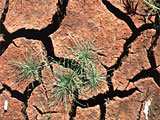Soil Smuggling in Indonesia
By Jody Ray Bennett for ISN
Indonesia has over 17,000 islands in a constant state of evolution thanks to water levels, volcanic eruptions, earthquakes and other natural occurrences. Indeed, just three years ago, an 8.1 scale earthquake external pagecreated a clustercall_made of six new islands off the coast of Sumatra. And at least 900 of these islands are permanently inhabited.
But natural occurrences are not the only thing affecting the evolution of these islands: Soil piracy is now causing some of these islands to disappear. The heightened demand from surrounding states for land - specifically for the development of soil and gravel - has created a new form of black market for Indonesia’s external pagevaluable type of top soilcall_made and rocks, hauled off by the boatload and sold to buyers throughout Southeast Asia.
Indonesia’s “external pagegravel banditscall_made,” as the external pageTimes of London reportedcall_made, are the result of the fact that “sea reclamation projects in China, Thailand, Hong Kong and Singapore are driving [the] black market in Indonesia’s abundant supplies of soil, sand and gravel.”
Managing the soil smugglers
According to The Times, “Since 2005 at least 24 small islands have disappeared as a result of erosion caused by sand mining. Even where they remain above the waves, the mining process clouds and muddies the sea, devastating fish populations and destroying livelihoods.”
Regional NGOs and local environmentalists have also noticed the phenomenon, in one case reporting that on the island of Krakatoa, “[…] a huge barge, the kind [used] to carry coal […] was pumping up the sand through pipes [in what is] a national park and a UNESCO World Heritage site […]. The local people rely on the fishing and the income from tourism, and here they were taking Krakatoa away.”
In 2007, the government of Indonesia banned the export of its island soil and threatened “a shoot on sight policy against foreign sand pirates and gravel bandits.” But as The Times notes, “corrupt local officials [continue to] sign off on permits and turn a blind eye to where the material ends up, [so] the smugglers are winning.”
Neighboring Singapore, which recognized Indonesia's island borders through a maritime boundary agreement signed in 1973, external pageannouncedcall_made that it was “disappointed with Indonesia's decision, but the [Singapore] government believes the ban is unlikely to slow the construction sector” and is “prepared to work with Indonesia to address [the] concerns [by] conduct[ing] regular checks to ensure the sand imported is supplied by licensed firms, which have environmental control measures in place, according to Indonesia's laws.” Before the ban, Singapore legally imported $120-160 million tons of soil per year from Indonesia.
While the ban on soil, sand and gravel exports have helped to circumvent some of the illicit trade, a external pageDecember 2009 Human Rights Watch reportcall_made found that illegal logging and shipping of timber from many of these islands was on the rise, resulting in adverse impacts on the natural environment, forestry industry, public health and human rights.
“If such threats disturb the security of shipping lines, it is going to influence sea-borne trade activities. [Regional governments] seem to find it complicated or difficult to manage this issue, especially because it is a transnational and trans-border issue that requires coordination between state non-state actors to work together,” doctoral researcher at the Graduate Institute of European Studies Taiwan, Supamijoto Paramitaningrum, told ISN Security Watch.
A new security market
In 2007, external pageIndonesia requested maritime security assistancecall_made from Japan, China and Korea, but little materialized. To fill in the gap, private maritime security companies are now attempting to secure contracts from the Indonesian state and other private sources to patrol through the islands to prevent further exploitation of Indonesia’s natural resources.
“This market has emerged primarily because of previous maritime security problems that occurred in the external pageMalacca Straitcall_made. Singapore, Indonesia and Malaysia (the littoral states) already had a joint patrol program, but that cooperation has not been enough to tackle maritime piracy problems, due to technical issues, such as human resources and funding,” Paramitaningrum explained.
“At the same time, international user states, like the US, Japan and Australia, are willing to help - but with their own mechanisms plus human resources and funding - which is responded to reluctantly by Indonesia and Malaysia,” she said.

